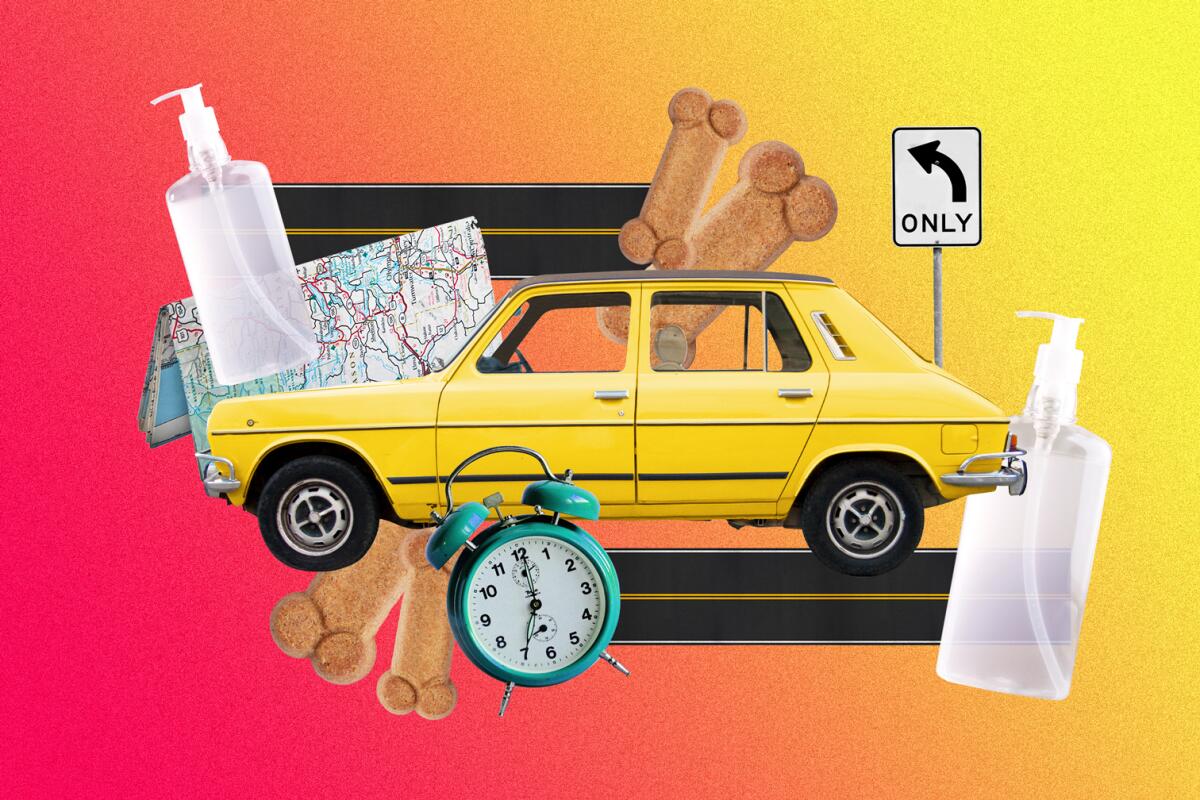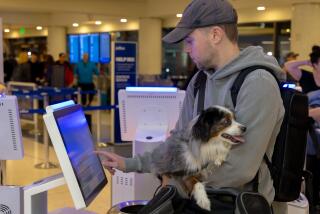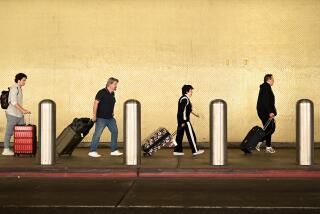What you need to know before you take a road trip this spring

- Share via
If your spring break or summer vacation plans involve a road trip, you have some work to do. Just hopping in the car and going? That’s so 2019. Today’s car traveler must be a road warrior, never caught unawares by this strange new travel world.
Here is what to know before you pile the kids in the back and head off.
Leave almost nothing to chance …
Gone are the days when you hit the road carefree and ready for adventure. Today, the best kind of adventure is the one you want to have, not the one you have because you didn’t do your research. Problem areas to consider:
• Safety. Of course you’ll have hand sanitizer, antibacterial wipes, a “restroom kit” with soap, hand sanitizer, a few paper towels and toilet seat covers. You’ll also carry masks and understand what the mask mandates are at your destination. You already know that President Biden has mandated masks on public transportation, which includes ride shares and taxis. Why would you take these forms of transportation instead of driving your car? Sometimes it’s cheaper than parking wherever you’re going.
But let’s say you’re going to Oregon. Quick, what do its laws require? How about Arizona? Nevada? Check out the U.S. News list of what’s required where at bit.ly/statemaskrequirements.
• Lodging. You’ll want to map out where you’re staying and check out whether the lodging’s cleaning protocols match your expectations. In perusing websites of four well-known chains, three mentioned COVID-19 precautions on the homepage; the fourth never mentioned them. (Just because a lodging chain says it’s taking extra precautions doesn’t make it so, but not to mention this at all seems tone deaf.) If you have questions, call and ask.
• Gasoline
In late April and early May of 2020 a gallon of gas in California hovered around $2.60. You’ll now pay an average of $3.50, AAA Gas Prices reported Feb. 18. But don’t sweat it too much. If you’re driving, say, a 2018 Toyota Camry from L.A. to Phoenix, your gas tab will be about $64, about $17 more than you would have paid in May.
Hotels may be less expensive this year: Occupancy was down more than 44% for 2020, and the average daily room rate declined 21.3% to just over $103 a night, according to STR, which provides research and analytics to the hospitality industry. The economic scales of justice may just balance out.
• Dogs. Taking your pet on vacation is another reason to ensure you have lodging choices in advance. There may be more travelers on the road with their hounds in tow, especially now that many airlines have banned emotional support animals in the cabin. (Most airlines do allow dogs in the cabin, but you’ll pay for that ticket, space is limited, and the animal must stay in the crate.) If you want your BFF along for the ride — and how could you not? — do your homework. The American Kennel Club offers a list of pet-friendly motels . Call ahead.
… except shopping
Remember that walnut bowl you didn’t stop to look at in Arkansas? How about the gorgeous rugs you passed up in New Mexico? Yes, you want to keep to a schedule, but you need some flex time. Remember the shopping mantra: You regret only the things you don’t buy. That’s how I ended up with an Amish console table that wasn’t on the agenda during a spring training trip to Arizona. Good table, great memories.
Don’t sacrifice sleep
It’s not a good idea to skimp on sleep, said Dr. Ann Romaker, professor of medicine at the University of Cincinnati and director of the university’s sleep medicine program. “Being sleep deprived is considered as bad as drinking and driving,” she said. “You have a moral and legal obligation to get better than adequate sleep at night.”
About 100,000 auto accidents occurred because of drowsy driving, according to a National Safety Council report on the National Highway Traffic Safety Administration’s 2020 statistics. That number may be far higher, however, because it’s easier to deny drowsy driving than, say, alcohol impairment for which there is a test.
You may be tempted to press on to get another couple of hundred miles in before you end the day. You might want to ask whether it’s worth it, said Dr. W. Christopher Winter, a neurologist and sleep specialist in Charlottesville, Va.
“Our brains work best on a schedule, so the more you can build in regularity, even when traveling by automobile, the better,” said Winter, author of “The Sleep Solution” and “The Rested Child,” the latter to be published later this year. Most humans can get by with five hours of sleep, he said, but more is better.
Factor in fatigue. National Safety Council statistics show that most fatal accidents in spring and summer happen between 8 and 11:59 p.m. Also, stats from the National Highway Traffic Safety Administration show more traffic fatalities, not fewer, in the first nine months of 2020 (fewer cars meant increased speed) over the same period in 2019.
Better to call it a day, grab some dinner, check in, bed down and queue up a movie for the kids.
You’ll have an easier time if you don’t radically alter kids’ schedules, Winter said. Although it’s tempting (and good for a parent’s sanity) to suggest an afternoon nap for the children while you make headway on the highway, Winter has a different approach: He calls for “rest time” of 30 minutes, avoiding the word “nap” because it adds pressure. After 30 minutes, whether everyone is asleep or wide awake, rest time is over and the drive continues.
And just in case kids have built up a head of steam after long hours in the car, Romaker, mother of four children, suggests these magic solutions: Find a park in a small town and let them run, and/or stay in a motel or hotel with a swimming pool.
Finally, remember that the clock springs ahead an hour on March 14, the start of daylight saving time almost everywhere except Arizona, which does not observe it, although the Navajo Nation does.
Have a travel problem, question or dilemma? Write to catharine@catharinehamm.com. We regret we cannot answer every inquiry.
More to Read
Sign up for The Wild
We’ll help you find the best places to hike, bike and run, as well as the perfect silent spots for meditation and yoga.
You may occasionally receive promotional content from the Los Angeles Times.







